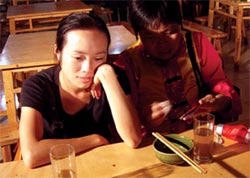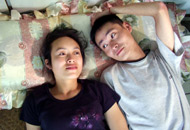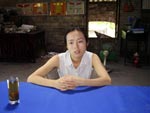Ground Zero: 2007 San Francisco International Film Festival (Part 7)
 |
"Half of life is fucking up, the other half is dealing with it."
-- Henry Rollins
On the face of it, this is an oddity of a film -- a modest indie feature set in Sichuan province, using a cast of unknowns (mostly friends and relatives of the director-producer team of Ling Yiang and Peng Shan), shot on consumer-grade DV, graced with some of the most primitive foley effects you can imagine, a film that puts the "low" in "low budget". But the history and fact of its existence might be the even greater story here, and a sign of what the future might hold for indie filmmaking in China.
The story is reminiscent of the "cinema verite" projects of Zhang Jiake (Platform, Unknown Pleasures) -- it's a long, almost clinical look at small lives in a small town. Zeng Xiaofei (played by, er, Zeng Xiaofei) is a young, average woman (although everyone she meets notes her facial similarity to Zhang Ziyi) who ends up taking a job as a stenographer for a law office that appears to be run in what remains of a barnhouse. There we're exposed to a multitude of stories from clients who come in, seeking legal counsel. As you would expect, their stories are nutty and whimsical, and are lifted from real-life cases: husbands who bite off the ears of their wives; wives who steal their husbands' clothes; a PR flak who wants to sue her company because her liver's been destroyed by all the late-night drinking binges she's been forced to take her clients on; a woman who isn't allowed to divorce an army officer.
 |
Most of the film is composed of long and medium shots of the characters and their surroundings, and in the process we see a bombed-out town: rainy flyovers and intersections, cracked streets, tawdry little dance halls and restaurants. Despite the limited budget, Ying wrings out some striking compositions, including a final shot down the length of a bridge that haunts in its matter-of-factness. Primitivist in the telling (the acting and overall look won't win any awards), the movie is a bit overlong with repeated episodes, and we're kept at a remove from our heroine's troubles and fears. In that sense, the film is kin to Zhang Jiake -- we observe these people like bugs under a glass, but we also sense a certain understanding and sympathy for their plights, as distant as they may seem. And the glancing criticisms of urban decay and the government's role in said decay are surprisingly strong, too.
 |


0 Comments:
Post a Comment
<< Home